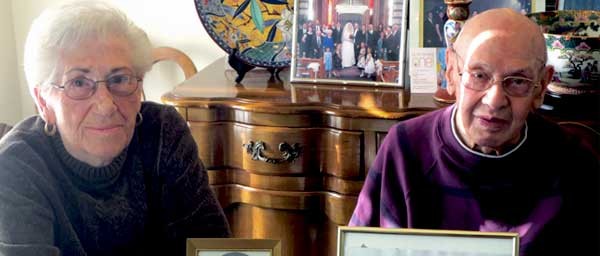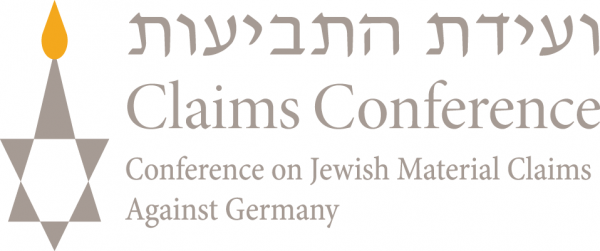Survivor Stories: Hyman and Anna Kirsh

Anna and Hyman Kirsh of Philadelphia, both Shoah survivors, receive homecare assistance from the Jewish Family and Children’s Service of Philadelphia, a Claims Conference-supported agency.
Hyman Kirsh and his wife, Anna, have lived in Philadelphia since they came to the United States in 1947. Both from Ciechanow, Poland, a city 60 miles northwest of Warsaw, they had never crossed paths until the war ended, when Hyman found the young woman sleeping on the floor of a Jewish community center in Lodz. They have been together for 67 years.
Both are survivors of the Shoah. Hyman’s father was a member of the Ciechanow Judenrat, and after being told in January 1940 by the Gestapo that he must report weekly, he fled. “He would have to be a squealer, and he wouldn’t do it,” Hyman said of his father. Hyman, then 16, went in search of his father, finding him with amputated fingers in a hospital across the Austrian border. The men asked to be sent back to Poland but instead were deported to the Baranovichi ghetto in Belarus, where Hyman nursed his father back to health.
Hyman and his father escaped, and were hidden by partisans until the end of the war. “When the Russians advanced we were free, so we came back to our hometown, but everyone was gone,” Hyman remembered. His mother and sister had been deported to Auschwitz; his brother, who had originally been with Hyman, got lost and was never seen again.
In December 1941, Anna was sent with her parents and eight siblings to the nearby Nowe Miasto ghetto. Soon, a virulent epidemic killed her father and a younger sister. Anna herself caught the sickness and was fevered through the following Passover. But when the weather turned warm, feisty 19-year-old Anna ran away from the ghetto and found work with several Polish farmers, staying with one kind-hearted family for six weeks. “I was like a child there; their own kid, that’s how they treated me,” Anna said.
Then one day, the farmer warned her that Ciechanow’s Jews were being rounded up and that he would hide her at the farm. But worried about the safety of the farmer’s family if she was caught, Anna returned to the city and was quickly deported to Auschwitz, from which she was liberated. Anna is the only member of her family to survive the Shoah.
In May 1945, Hyman met Anna at the Jewish community center in Lodz, where refugees were gathering, searching for people from his hometown. “In the morning I came and said, ‘Who is from Ciechanow?’ ” Hyman said. “And Anna said, ‘I am.’ ” They married in December and soon left, stopping first in France before coming to the United States.
Hyman and Anna raised three children in Philadelphia, and are grandparents and great-grandparents. Now in their early 90s, they both suffer from angina, and use walkers due to severe arthritis. Anna needs hip surgery, but doctors are unsure it’s a good idea in her current condition. Hyman has some kidney problems.
After years of refusing homecare help, Hyman and Anna have finally begun to accept assistance from the Jewish Family and Children’s Service of Philadelphia, which receives funding for services to survivors from the Claims Conference. The Kirshes receive homecare assistance five hours a week, which includes housekeeping, personal care, cooking and food shopping. “It’s very hard for me to ask” for help at home, Anna said.
The couple are proud people and fiercely protective of their independence. “I’m not a person to lean on somebody,” Anna said. But “the housekeeper, she is wonderful.”
Through Claims Conference funding, the services the Kirshes receive enable them to stay in their home, knowing someone is there to help.

